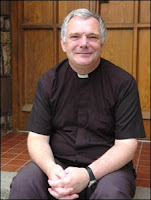“Therefore, since we are surrounded by so great a cloud of witnesses, let us also lay aside every weight and the sin that clings so closely, and let us run with perseverance the race that is set before us, looking to Jesus the pioneer and perfecter of our faith, who for the sake of the joy that was set before him endured the cross, disregarding its shame, and has taken his seat at the right hand of the throne of God.” (Hebrews 12:1-2)
This Sunday, we will worship God by celebrating All Saints Sunday. This Sunday reminds us that we are not alone in confessing our faith in God through Jesus Christ. Rather, we stand on the shoulders of those who have gone before us. We stand on the shoulder of famous witnesses to the Christian faith who, in some cases, have paid with their own life for clinging to the gospel of love and mercy and forgiveness; and we stand on the shoulders of many ordinary people who have passed on their values and beliefs to us. Without their witness to us, our faith in God’s grace, goodness, and love may have crumbled a long time ago.
As in years past, we commemorate those in our midst who have passed away since All Saints Day 2010. We will solemnly read their names out lout; and with gratitude we will remember the goodness they have brought into our lives.
We will also remember this year, in a different way, countless other individuals who have died either recently or some time ago. When you enter the Bethel sanctuary this Sunday via the narthex (church entry), you will encounter a beautiful display of candles, photos, flowers, and other objects. I invite you to come to church and help us build this “table or remembrance” by bringing in photos or other objects that remind you of someone dear to you who has died. We also will have paper available to you to write down names of individuals whom you wish to remember and to celebrate this Sunday.
The idea for this “table of remembrance” is borrowed from the “dia de los muertos” (Day of the Dead) which is celebrated in Mexico and other countries, but with a slight Lutheran twist. Lutherans, as you may know, refrain from venerating saints in the Roman Catholic or Christian Orthodox manner. We don’t believe that saints have attained a higher standing before God than other Christians, we don’t believe that they have earned God’s love in a special way, and we don’t pray to saints asking them to intercede for us with God.
We do, however, believe that there is a strong bond between the church on earth and the church triumphant. We believe that there is a strong bond between Christians who are confronted daily with negotiating the demands of the world and the demands of faith and Christians who now see god face-to-face in all of God’s heavenly glory. We also believe that it can be very beneficial to us to listen to the stories of people who, in the midst of conflicting priorities, chose to be on the side of Jesus Christ. Their stories can strengthen and embolden our own faith, no matter whether they were famous in their own day or not.
Thus – please bring photos or objects to church that remind you of deceased individuals who have been influential in your own life and add them to the “table of remembrance” in the narthex.

















